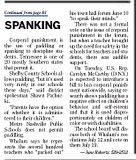The Tribune-Herald, Waco, Texas, 17 June 2010
La Vega Elementary School principal not indicted in student's paddling
By Erin Quinn
Tribune-Herald staff writer
A McLennan County grand jury Wednesday found the La Vega Elementary School principal did not break the law in February when he paddled a student.
Christopher Ryan Borland, 37, acted within the district's school corporal punishment policy, which allows educators to paddle students, the grand jury found.
"Mr. Borland has a really great reputation as an administrator," said his attorney, Bill Johnston. "You just hate to see something like this happen to someone who has worked so hard, as Mr. Borland has."
A county grand jury said La Vega Elementary School principal Chris Borland did not break the law when he paddled a student.
Borland was suspended after his Feb. 8 arrest.
Information was not available late Wednesday about Borland's employment status.
McLennan County Assistant District Attorney Lytza Rojas said she was told by a La Vega school official that a meeting will be held this week on the subject.
Borland did not return a call to his home.
He has been out of jail on $4,000 bond, which he posted the day of his arrest.
The student's grandparents called authorities after the student was seen at a local hospital for injuries associated with paddling.
Borland was charged with third-degree felony injury to a child.
Rojas said the grand jury was presented with evidence gained from interviews with witnesses and medical professionals.
Former Bellmead Police Chief Robert Harold said in February the line between sanctioned paddling and a crime is when investigators can see evidence of injury to the child that suggests force above and beyond that of normal paddling was used.
The Commercial Appeal, Memphis, Tennessee, 27 June 2010
Spanking proposal stirs up feelings
Buzz goes national after school board's meeting
By Jane Roberts
Rev. Kenneth Whalum struck a national chord when he asked his fellow city school board members to consider reinstating corporal punishment.
Within 24 hours of last week's meeting, ABC World News had the story and accompanying Web poll on the appropriateness of in-school spanking. The education news site detentionslip.org -- named on Time magazine's 2009 list of the top 25 blogs in the world -- is proposing a Memphis boycott.
"We are not going to do business in a community that supports violence against children," said Anthony David Adams, DetentionSlip founder, planning specifically to dent the Memphis music industry.
As of Friday, he was "booked" to talk about his strategy on ABC, NBC and Fox Strategy Room.
Whalum did not respond to requests for comment Friday. But he told the "Drake & Zeke" radio show on WXMX-FM 98.1 he was as surprised as anyone when the motion got a second.
"All of a sudden, Sharon Webb broke ranks. You should have seen the looks on the other guys' faces," he said.
Memphis city school board banned the practice in 2004 in a 5-4 vote, setting off community furor on both sides.
Patrice Robinson, the only member of the 2004 board still serving, remembers it well because she cast the deciding vote. She doubts Whalum's resolution will go anywhere.
"There is no support to change. We haven't discussed it; no one has even mentioned the need to change."
Webb said her second is not so much a sign that she believes in corporal punishment as much as she wants the community to have a "conversation" to get "clarity and closure."
"The misconception is that corporal punishment is equal to authority. We didn't take authority from teachers. You don't have to have corporal punishment to control your classroom," she said.
Webb also seconded Whalum's resolution that the district rehire the hundreds of part-time teachers aides it laid off this spring.
Corporal punishment is the use of paddling or spanking to discipline students. Tennessee is one of 20 mostly Southern states that permit it.
Shelby County Schools allows paddling, "but it's used very rarely in our schools these days," said district spokesman Shawn Pachucki.
"Parents have the option of whether it is administered to their children."
Metro Nashville Public Schools does not permit paddling.
Whalum says he represents the several hundred teachers who "packed out" his town hall forum June 10 "to speak their minds."
There was not a formal vote on the issue of corporal punishment in the forum, but when a teacher brought up the need for safety in the schools for teachers and students, there was audible support.
On Tuesday, U.S. Rep. Carolyn McCarthy (D-N.Y.) is expected to introduce a bill to ban corporal punishment nationwide, saying research shows paddling has a negative effect on children's behavior and self-esteem and that it is used disproportionately on children of color or with disabilities.
The school board will discuss both of Whalum's resolutions July 12 and vote on them July 19.
© 2010 Scripps Newspaper Group Online
RELATED VIDEO CLIPS
CLIP 1 OF 2
"Memphis City Schools Consider Bringing Back The Paddle", 3-minute news report from My Eyewitness News (ABC24 CW30), Memphis TN, 22 June 2010. Jeni DiPrizio reports on school board meeting. Board members Dr Kenneth Whalum and Sharon Webb are interviewed. Negative comment by the Board President.
HERE IS THE CLIP:
This video clip is not currently available.
CLIP 2 OF 2
Three-minute report by Fox News (late June 2010) in which Dr Kenneth Whalum is interviewed at greater length about his campaign to reintroduce corporal punishment in Memphis. The attempt in Congress by Rep. McCarthy to abolish school CP at national level is also mentioned.
HERE IS THE CLIP:
This video clip is not currently available.
IMPORTANT: Copyright in this video material rests with the original copyright holders. This brief excerpt is reproduced under the "fair use" doctrine
for private, non-profit, historical research and education purposes only. It must not be redistributed or republished in any commercial context.
Follow-up: 12 July 2010 - School board says no to paddling
ABC-TV News, 29 June 2010
Legislation to Ban Corporal Punishment in Schools Hits Congress
Paddling Targets Minorities, Children With Disabilities, U.S. Reps. Carolyn McCarthy and Bobby Scott Say
By Sarah Netter
The debate on corporal punishment reached Washington today where a New York congresswoman introduced legislation to remove paddles from U.S. schools.
Critics argue that hitting kids in schools hurts them socially and emotionally.
While the idea of taking a paddle to a student's backside may seem archaic, even barbaric, it's still a well-regarded form of discipline in some corners of the country, mostly in the South.
U.S. Rep. Carolyn McCarthy, D-N.Y., said she's hoping to get her bill folded into a larger education package that could be debated later this year. She told ABCNews.com that she sees corporal punishment as a school safety issue that breeds more problems than it solves.
"We know that children that are paddled end up being more aggressive," she said. "They learned that conflict is handled by striking out and hitting."
McCarthy, who was herself rapped on the knuckles in Catholic school in the 1950s, said the paddle may not leave physical scars, but the emotional toll could last for years. Her legislation, she said, piggybacks on previous federal laws outlawing hitting a child in a Head Start program or a hospital setting.
"When you see where the paddling can actually physically harm a child, those are the wounds you can see," she said.
Bill co-sponsor U.S. Rep. Bobby Scott, D-Va., who was paddled lightly in elementary school, agreed, citing studies showing higher dropout rates for students were who hit in schools.
"It teaches the child that if you don't like what's going on you resort to violence," he told ABCNews.com "What kind of message is that?"
McCarthy said she hasn't gotten public pushbacks on her effort, "but I'm sure I will."
Corporal punishment is seen by some educators as an effective way to curb growing trends of student violence and misbehavior. And new advocates for corporal punishment are making headlines with regularity.
According to the U.S. Department of Education's Office for Civil Rights projections for 2006, the most current data available, more than 223,000 children got the paddle, compared with more than 3.3 million cases of suspension and more than 102,000 expulsions.
Last week, the school board in Memphis, Tenn., agreed to consider allowing corporal punishment in its schools after teachers said they would like the option, tired of current discipline options failing to make a difference.
According to the Center for Effective Discipline, taking their data from the Office for Civil Rights, Texas took the lead in the 2006-2007 school year with 49,197 students paddled. Mississippi came in second with 38,131, with Alabama close behind at 33,716. Based on the number of students in each state, Mississippi used corporal punishment most often, paddling 7.5 percent of its students that year.
Earlier this year, Gilbert Leal, a tutor with the Dallas Independent School District, led a movement to "Bring Back Licks" in the school system, saying kids needed a reason to fear consequences for their bad behavior.
"There aren't a lot of alternatives to dealing with 20 kids that get out of control because of one," he told ABC News in May. "You can suspend them, send them to the office. We have a great school counselor. ... And when none of that works, what do you do?"
Leal was subsequently released from his job with the Dallas district.
In addition to their argument that paddling only teaches violence with violence, Scott and McCarthy said corporal punishment is used more often on minority and special education students -- black students were more than twice as likely to get hit than white students, they said.
The department's data showed that 53 percent of the children disciplined with corporal punishment were white, compared with 35 percent for black students. But black students make up just 17 percent of the school population, compared with whites at about 56 percent.
McCarthy and Scott suggested schools do less hitting and more positive reinforcement, rewarding children for the behavior educator's expect.
Paddling, Scott said, "does not inform the student as to what they should have done. Maybe what they should not have done."
There is currently no timetable for Congress to debate an education bill. But McCarthy said she's hopeful she'll significantly build on the bill's current 16 co-sponsors in the meantime.
"I have a very strong feeling that I can get this into the major part of the education bill," she said.
About this website
Search
Article: American school paddling
Other external links: US school CP
Archive 2010: USA
Video clips
Picture index
Previous month
Following month



